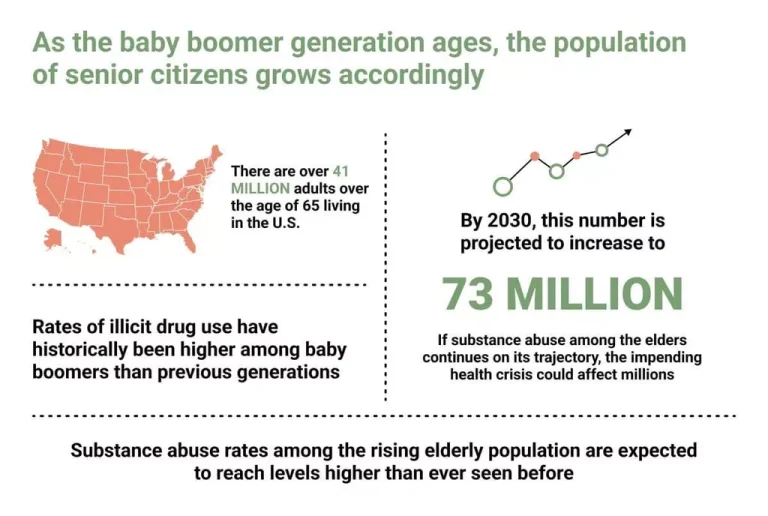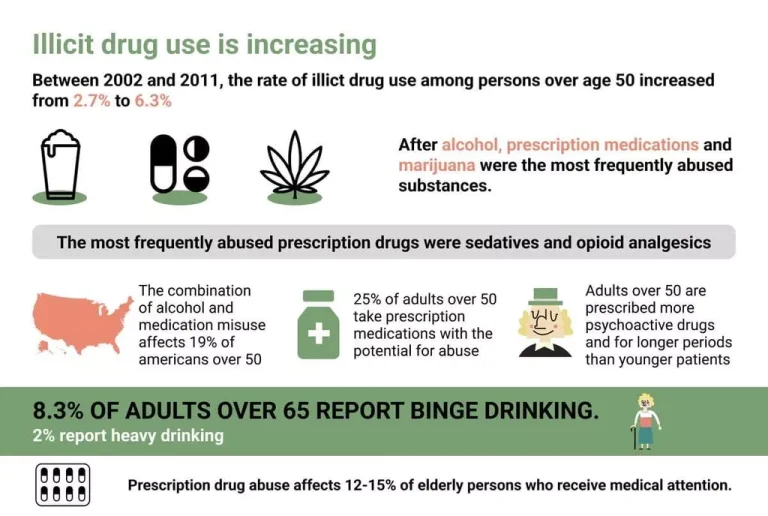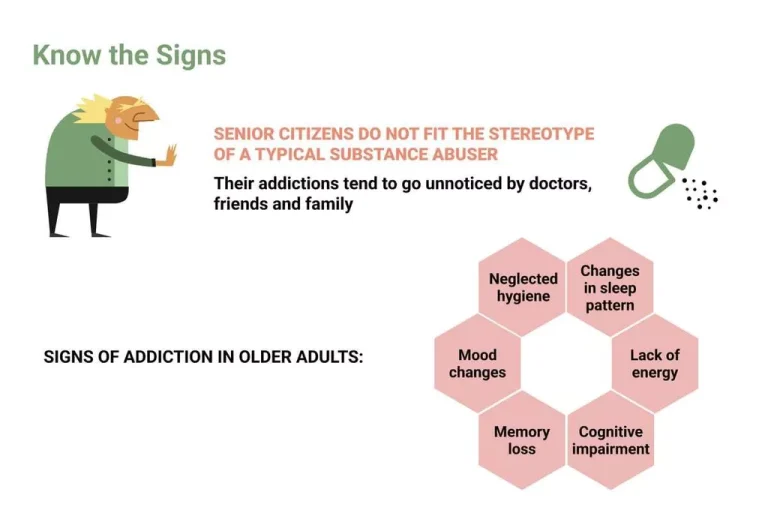Substance Abuse in Older Adults: The Rising Danger

According to recent research, substance abuse in older adults has become a growing threat nowadays. As individuals get older, their body’s response to alcohol and drugs undergoes significant changes. It applies primarily to seniors who often take multiple medications, some of which may pose a significant danger when taken with alcohol. The elderly should be cautious and aware of the exposure associated with mixing certain substances.
Medication abuse can unintentionally happen if individuals up in years are not fully informed about how their bodies may react to certain substances. It is essential to consider improper medications, excessive alcohol consumption, or a combination of both may fuel all physical or mental issues commonly driven by aging or illness. The elderly should be mindful of these factors to address and manage one’s health concerns accurately. We prepared an infographic to display the most important aspects of substance abuse in the last couple of years. Moreover, we’ll shed some light on what is the best treatment for substance abuse in older adults.
Why is this topic crucial?
Substance abuse poses a great threat and has a considerable impact on older people. It covers excessive drug consumption, drunkenness, and misuse of prescription drugs. It brings on chronic health conditions, particularly among older persons, and difficulties arising within the inner circle, neighborhood, place of employment, and law. There are a few reasons why alcohol may pose a detrimental risk to seniors’ lives:
- Consuming the same amount of alcoholic drinks as a young person will give rise to a blood alcohol level of 30–40% higher in an adult 65+. Older organs have less alcohol dehydrogenase accessible, resulting from this.
- Additionally, as people age, their organs hold less water, leading to less drink dilution.
- Alcohol intoxication, cognitive decline, and motor coordination issues are more probable with high blood alcohol levels.
The elderly are more susceptible to the effects of substances due to transformations in the body and metabolism with age. It grows the peril of addiction and overdose. Therefore, handling substance abuse is vital.

Take back control of your life and start on the road to recovery now.
Growing statistics
Following the SAMHSA survey, 4 million seniors aged 50+ had a substance-induced disorder in 2017. This represented 12% of all substance use disorders that year. Experts expect these numbers to extend considerably as the population of seniors keeps on expanding.

Some other key statistics:
- Up from 2.4% in 2015, 4.2% of people aged 65+ were taking marijuana in 2018.
- Outcomes from the Drug Abuse and Mental Health Services Administration’s 2018 national survey disclose that almost 1 million people aged 65+ (or 2% of all seniors) claimed substance abuse troubles.
- Seniors are more prone to having issues with prescription medication addiction. Significant nationwide research on people from 57 to 85 years old claimed that 36.0% of women and 37.1% of men are taking at least five drugs simultaneously.
- Prescription medicine misuse affects 12-15% of the elderly who receive medical attention.
- Prescription sedatives and painkillers, as well as medical marijuana, are the medicinal drugs that older individuals misuse eminently.
- Substance abuse often goes undetected and untreated due to a deficiency of examination and age-related stigma. Only about 10% receive treatment.
Experts advise extending education programs tailored to families and caregivers, enhancing access to age-appropriate treatment plans for senior patients, and boosting testing for drug use problems among the elderly. Without intervention, this rising issue will eventually overwhelm the healthcare system.

What is the best treatment for substance abuse in older adults?
Addressing substance misuse in the elderly requires specialized care approaches tailored to their needs. Here are some effective methods of how to handle effectively substance abuse in older adults:
- Medical therapy. Among senior individuals who rely on opioids, medicinal drugs such as methadone and buprenorphine offer significant relief by reducing both cravings and discontinuation syndrome.
- The cognitive behavioral approach. Talk therapy aims to pinpoint and alter the mental attitudes and behaviors underpinning substance misuse. Older individuals who want to comprehend coping mechanisms and relapse prevention techniques might benefit from therapy.
- Family engagement and support. Particularly among older persons with drug misuse disorders, involving relatives in treatment can help provide encouragement, accountability, and practical aid. Family counseling could also be beneficial.
- Treating coexisting diseases. Many older people who struggle with drug misuse often have other physical or mental health concerns that require treatment, such as chronic pain, despair, or anxiety. All of these problems may be solved with a thorough treatment plan.
- Residential and inpatient programs. Live-in treatment strategies offer intense care and support in a structured setting with access to medical and nursing care for seniors with extreme substance use conditions.
Support groups and ongoing treatment is another popular treatment. For older persons dealing with substance misuse, continuous therapy, medication management, and peer support groups can support sobriety and stem relapse.
Long-term sobriety is possible
Addiction is a common danger among numerous elderly people. Alcohol tolerance, drunkenness, and other issues brought together with substance use frequently differ from those manifesting during the youthful stage.

Age-related illnesses, diseases, and treatments may have unanticipated consequences on substance usage. Additionally, it might be challenging to differentiate between early-stage dementia and the cognitive side effects of substance abuse in older adults. Later, there is a strong correlation between loneliness, despair, alienation, and binge drinking.
A vital gap in addiction therapy is the zero background in aging and the absence of proper care. A brief medical consultation on alcoholism is suitable for certain elderly patients. Psychotherapy sessions must be longer for some people, such as trauma survivors. After the examination, elderly people often start therapy right away. Home care and health services, healthcare workers, and drug treatment facilities must work closely under expert management to spot and foreclose the alcohol problem effectively.

This can be a difficult journey, but you don’t have to go it alone. Let us be your guide and provide you the environment needed to regain control of your life and begin the path to recovery.
Battle the addiction together with Eco Sober Houses
One of the most significant places providing a thorough approach to adult addiction recovery is Eco Sober Houses. Located in Boston, Massachusetts, the facility includes supportive community, mentoring assisting your advancement, and a secure atmosphere that caters to your recovery motivation. Our clients aim to remain sober and heal.
A comprehensive approach to the client’s well-being, encompassing physical, emotional, and spiritual components, is required to complete recovery. Our clients are embraced in a supportive structured environment that values and welcomes the unique journey of each person. Moreover, they get more than just sobriety; they realize their own mistakes and develop their own mechanism against relapse. Individuals become part of the brotherhood and find friends.
If you or your loved ones need help, never be ashamed to ask for it. You can call the hotline and get a free and anonymous consultation from a specialist. Starting a new life is difficult, but suffering from the consequences of addiction and destroying your life is more challenging and painful. Choose a happy, healthy life and see how blessed you can be without substances.




